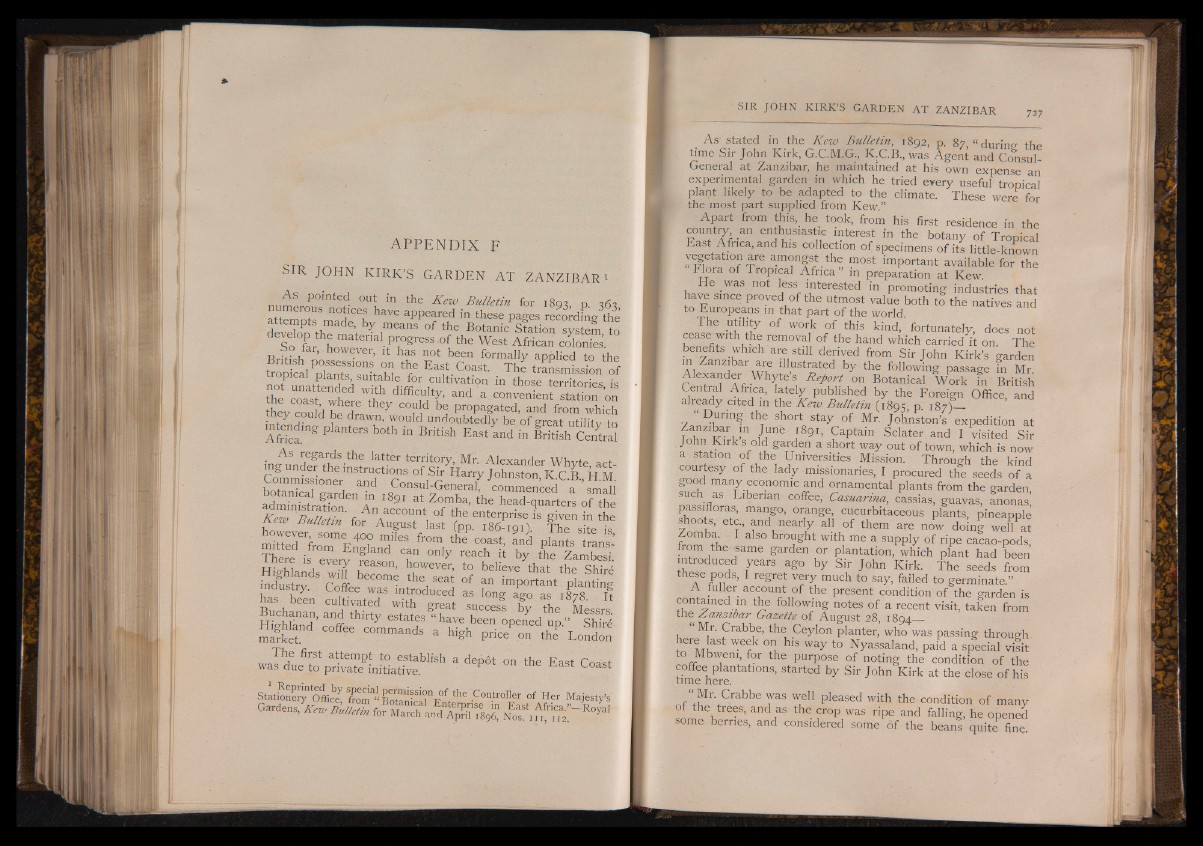
a p p en d ix f
SIR JOHN K IR K ’S GARDEN A T ZANZIBAR i
A s pointed out in the Kew Bulletin for i8qi o
attemnt^mad106^ haVS appeared in these pages recording the
attempts made, by means of the Botanic Station svstem to
devel°p thematenal_ progress .°f the West African colonies.
P . J L ‘ GVer’ 11 has not been formally applied to the
British possessions on the East Coast. The transmission of
tropical plants, suitable for cultivation in those territories is
"he M r & T 1 1 1 “ d a K I É É É É Í I
they could bed™ °m ! propagated, and from which
tney could be drawn, would undoubtedly be of great utility to
mtendmgpianters both in British East L d in BrEiL Cental
As regards the latter territory, Mr. Alexander Whvte acting
under the instructions of Sir Harry John s tonK CB HM
Commissioner and Consul-Generalf commencdd a sm a ll
a t o T „ ', í r a t a enA „ ' 89' the » « ¡ 1 Í Í of the
K p-u B u ll /• r account of the enterprise is given in the
Kew Bulletin for August last (pp. 186-191). The site is
mitteTfrom" F 4°l’ S * fr°mitted from England can omnl yt hree aHch it Hby tPhhe nZtsa mirbaensií
u if« everZ reason, however, to believe that the ^hiré
2naust“ry. CCWooffLeeb ewCOasm ein ltroi dBuced °afs 1lon gI mapo-o0r taans t 18p7la8n tinIgt
« £ j r " CUi t,' ? ted with success Sy L MessL
Buchanan, and thirty estates “ have been opened up ” Shirá
Highland coffee commands a high p r i c e ^ t h e " 'L o S
. | Í 3 , g i a | j O" the East Coast
A j g K J of Her Majesty,
As'stated in the Kew Bulletin, 1892, p. 87 “ durinp- the
time Sir John Kirk, G.C.M.G., K.C.B., was Agent and Consul-
General at Zanzibar, he maintained at his own expense an
experimental garden in which he tried every useful tropical
plant likely to be adapted to the climate. These were for
the most part supplied from Kew.”
Apart from this, he took, from his first residence in the
E H enf uslastlc interest in the botany of Tropical
East Africa, and his collection of specimens of its little-known
vegetation are amongst the most important available for the
Flora of Tropical Africa ” in preparation at Kew.
He was not less interested in promoting industries that
have since proved of the utmost value both to the natives and
to Europeans in that part of the world.
The utility of work of this kind, fortunately, does not
cease with the removal of the hand which carried it on. The
f w f , ? A are still derived from Sir John Kirk’s garden
Zanzibar are illustrated by the following passage in Mr
Alexander Whyte s Report on Botanical Work in British
Central Africa, lately published by the Foreign Office, and
already cited m the Kew Bulletin (1895, P- 187)_
During the short stay of Mr. Johnston’s expedition at
>n ¿ une j 89 b Captain Sclater and I visited Sir
. lr s 0 d garden a short way out of town, which is now
a station of the Universities Mission. Through the kind
courtesy of the lady missionaries, I procured the seeds of a
good many economic and ornamental plants from the garden
such as Liberian coffee, Casuarina, cassias, guavas, anon as!
passifloras, mango, orange, cucurbitaceous plants, pineapple
shoots, etc., and nearly all of them are now doing well at
l i f e - 1 also broV§ht witb me a supply of ripe cacao-pods,
from the^ame garden or plantation, which plant had been
introduced years ago by Sir John Kirk. The seeds from
these pods, I regret very much to Say, failed to germinate.”
A fuller account of the present condition of the garden is
contained in the following notes of a recent visit, taken from
the Zanzibar Gazette of August 28, 1894_
Mr. Crabbe, the Ceylon planter, who was passing through,
!!?ri\/rk W6f ° n, s way to Nyassaland, paid a special visit
o Mbweni, for the purpose of noting the condition of the
coffee plantations, started by Sir John Kirk at the close of his
time here.
“ Mr Crabbe was well pleased with the condition of manv
of the trees, and as the crop was ripe and falling, he opened
some berries, and considered some of the beans quite fine